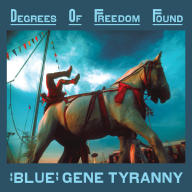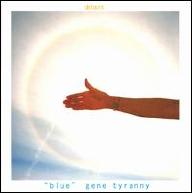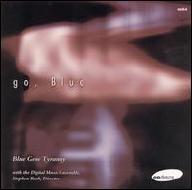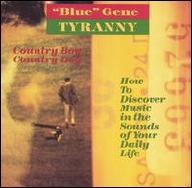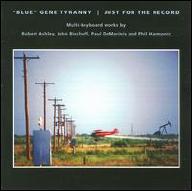Born in San Antonio, Texas, in 1945, Tyranny lived in each of the four corners of mainland U.S. During the late '50s, he studied with pianists Meta Hertwig and Rodney Hoare, composers Otto Wick and Frank Hughes, and organized new music events in Texas with composer Philip Krumm, including several festivals at the McNay Art Institute -- premiering works by Cage, Corner, Maxfield, Ono, and others. After earning a BMI Student Composer's Award in 1961, he moved to Ann Arbor, Michigan. He performed there in his work and in many other events at the legendary ONCE concerts while also working as a waiter, sales clerk, and statistics coder. During the '60s and '70s, he toured with jazz and rock groups (Carla Bley Band, Iggy Pop, the Prime Movers Blues Band, etc.). From 1971 to 1982, as a Lecturer and Instructor in Music, he taught "Recording Studio Techniques", "Harmony and Counterpoint" (three levels)," and "Jazz Improvisation and Literature," and served on graduate committees in the Music Department of Mills College in Oakland, California. He also worked as a technician at the Center for Contemporary Music, a non-profit, community-access facility located at Mills College. He moved to New York in 1983, and lived in Brooklyn, where he was a self-employed composer/performer of solo and group concerts, audio consultancy, film/video/CD-R soundtracks, and commissioned work. He performed extensively in hundreds of concerts throughout the US, Canada, and Europe, and also in Mexico, Brazil, and Japan.
Blue produced, recorded, and performed on many albums of other composers' music (Laurie Anderson's Strange Angels, David Behrman's On the Other Ocean, John Cage's Cheap Imitation and Empty Words, etc.), and he composed the harmonies and piano improvisations for Robert Ashley's television opera #Perfect Lives (Channel Four, London). He created over 40 soundtracks for film and video, collaborating on projects with video artists Kenn Beckman and Kit Fitzgerald.
His theater and dance collaborations include pieces with the Talking Band, performance artist Pat Oleszko (Nora's Art, ten film scores), scores for Timothy Buckley's dances Barn Fever (1983), Breakneck Hotel (1984), The Tourist Trap (1985), Proximology (1986); his videos Endance (1988, for PBS), Do This (1985), Man with an Idea (1985), The Sleeping Man (1996); his theater works A Leap in the Dark (1987) and Prisoner of Gravity (1996), etc.; Rocky Bornstein's dances Labor of Love (1988), Double Your Pleasure (1989), Unsung Song (1991), etc.; the Bill T. Jones/Arnie Zane Dance Company's The History of Collage (1988); the Creach/Koester Dance Company's I Witness (1995); Trisha Brown and Steve Paxton's Long and Dream (1996); live electronic music for Stefa Zawerucha's The Black Box (1993), Curve Ahead (1994), Piano Dance (1996), Legal While Moving (1998); and many of the Otrabanda Company's plays including Re Room (1985), Brain Café (1987), Quasi-Kinetics (1989), Green Eyes Are Fine (1991), Simpatico (1993), The Alien Project (1995), etc.. He received a Composer Award at the Bessies (NY Dance and Performance Awards) in 1988, a Composer Fellowship from the NY Foundation for the Arts in 1989, and a grant from the New York State Council on the Arts in 1998. He was an Artist-in-Residence at Bucknell University in 1992.
His articles on contemporary music include "Music Beyond the Boundaries" with Mark Slobin ("Generation," Univ. of Michigan, 1965) and the "20th Century Avant-Garde" section of the All Music Guide (Miller Freeman Pub., 1993, 1995, 1997, 1998). His work is the subject of chapters in Cole Gagne's Sonic Transports (DeFalco Books, 1990), Soundpieces 2: Interviews With American Composers (Scarecrow Press, 1993), William Duckworth's Talking Music (Schirmer Press, 1995) and Kyle Gann's American Music in the Twentieth Century (Schirmer Press, 1997). His music in analyzed in Kevin James Holm-Hudson's "Music, Text and Image in Robert Ashley's video opera 'Perfect Lives'" (unpublished doctoral thesis, U. of Illinois at Urbana-Champaign). Tyranny translated documentary material (German to English) for Kevin Lally's Wilder Times: The Life of Billy Wilder (Henry Holt & Co., 1996), was interviewed for Paul Trynka's Lust for Life: The Iggy Pop Story (Box Tree, London, 1996), and appeared as a character in Kathy Acker's "I Dreamt I Was a Nyphomaniac: Imagining" (in Portrait of an Eye, Pantheon Books, 1995) and in Mary Ashley's Truck (a dance) (1964, pub. as a Wolgamot - ONCE book by Burning Deck Press, 1972).
Recordings of his music include Country Boy Country Dog/How to Discover Music in the Sounds of Your Daily Life, a 25-year project for electronics, orchestra, and environmental sounds (Lovely Music CD), Nocturne with and Without Memory played by pianist Lois Svard (Lovely Music CD), The De-Certified Highway of Dreams performed by the piano duo Double Edge (on U.S. Choice, CRI Records), Somewhere in Arizona 1970 for baritone and electronics (in Imaginary Landscapes, Elektra/Nonesuch), and a selection of his live keyboard concerts under the title Free Delivery (Lovely Music CD). Other works include The Driver's Son (1989-1998), an audio-storyboard for voices and orchestra commissioned by the Electrical Matter and performed in 1991 in a work-in-progress version for the Benjamin Franklin bicentennial celebration; His Tone of Voice at 37 (Empathy) (1995, 1998) commissioned and recorded by vocalist Tom Buckner; The Drifter (1994) commissioned by pianist Joseph Kubera; Spirit for muted piano and computer-edited piano (artificial harmonics) (1996) commissioned by Bay Area Pianists for the Henry Cowell celebration; Holding Hands for hand movements and infra-red sensors; and The Keys: Keyboard Calculation Etudes for alternate and hypothetical keyboards.
Other selected compositions include Three Begins for voice and tape (1958), How Things That Can't Exist May Exist (pieces for alternative spaces), Ballad (graph score, 1960), Meditation (graph score, 1961), Diotima for flute, household percussion and electronics (1963), Just Walk on In (theater piece, 1965), Closed Transmission for IBM 7090 computer (1966), "The Bust" from Viet Rock (1967), Archaeoacoustics (1973), A Letter from Home (1976) for voices and electronics, PALS/Action at a Distance (1977), Harvey Milk/Portrait (1978), The White Night Riot (1979), The CBCD Variations for Soloist and Orchestra (1980, for the Arch Ensemble), The Intermediary for piano and shadowing electronics (1982), The Forecaster (1989) for double orchestra, decoding chorus, and time-transposing pianist. Blue Gene Tyranny died on December 12, 2020 in Long Island City, New York at the age of 75; his death was brought on by complications from diabetes. ~ All Music Guide, Rovi


